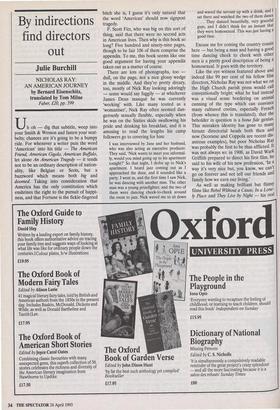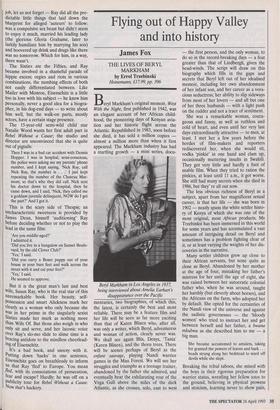By indirections find directors out
Julie Burchill
NICHOLAS RAY: AN AMERICAN JOURNEY by Bernard Eisenschitz, translated by Tom Milne Faber, f20, pp. 599 Uh oh — dig that subtitle, weep into your Smith & Wesson and fasten your seat- belts; chances are it's going to be a bumpy ride. For whenever a writer puts the word `American' into his title — The American Friend, American Gigolo, American Buffalo, let alone An American Tragedy — it tends not to be an ordinary description of nation- ality, like Belgian or Scots, but a buzzword which means both big and doomed. Taking into consideration that America has the only constitution which enshrines the right to the pursuit of happi- ness, and that Fortune is the fickle-fingered
bitch she is, I guess it's only natural that the word 'American' should now signpost tragedy.
F. Scott Fitz, who was big on this sort of thing, said that there were no second acts in American lives. Then why is this book so long? Five hundred and ninety-nine pages, though to be fair 106 of them comprise the appendix. To me, this book seems like one good argument for having your appendix taken out as a matter of course.
There are lots of photographs, too dull, on the page, not a nice glossy wedge in the middle. And they're pretty dreary, too, mostly of Nick Ray looking adoringly — some would say faggily — at whichever James Dean manqué he was currently `working' with. Like many touted as a `womaniser', Nick Ray often seemed dan- gerously sexually flexible, especially when he was on the Sixties skids swallowing his pride and drinking his breakfast, and it is amusing to read the lengths his camp followers go to covering for him:
I was interviewed by Jane and her husband, who was also acting as executive producer. They said, 'Nick wants to meet you informal- ly, would you mind going up to his apartment tonight?' So that night, I drdve up to Nick's apartment. I heard jazz coming out as I approached the door, and it sounded like a party. I went in, and the first time I saw Nick, he was dancing with another man. The other man was a young prizefighter, and the two of them were dancing cheek-to-cheek around the room to jazz. Nick waved me to sit down and waved the servant up with a drink, and I sat there and watched the two of them dance . . . They danced beautifully, very graceful guys, and I didn't think for an instant that they were homosexual. This was just having a good time.
Excuse me for coming the country cousin here — but being a man and having a good time dancing cheek to cheek with other men is a pretty good description of being a homosexual. It goes with the territory. Like the eye witness featured above and indeed like 99 per cent of his fellow film directors, Nicholas Ray was not what we on the High Church parish press would call conventionally bright; what he had instead was a visual sense bordering on animal cunning of the type which can convince many cultured cretins, especially French (from whence this is translated), that the beholder in question is a bona fide genius. This mistaken identity has gone to many hirsute directorial heads both then and now (Scorsese and Coppola are recent dis- astrous examples), but poor Nicholas Ray was probably the first to be thus afflicted. It was not always so; in 1908, as David Wark Griffith prepared to direct his first film, he said to his wife of his new profession, 'In a way it's very nice but, you know, we can go on forever and not tell our friends and family how we earn our living.'
As well as making brilliant but flimsy films like Rebel Without a Cause, In a Lone- ly Place and They Live by Night — his real job, let us not forget — Ray did all the pre- dictable little things that laid down the blueprint for alleged `auteurs' to follow: was a compulsive sex beast but didn't seem to enjoy it much, married his leading lady (the glorious Gloria Grahame, later to larkily humiliate him by marrying his son) and hoovered up drink and drugs like there was no tomorrow. Which for him, in a way, there wasn't.
The Sixties ate the Fifties, and Ray became involved in a shameful parade of hippie excess; orgies and riots in various combinations, the numbing effects of both not easily differentiated between. Like Mailer with Monroe, Eisenschitz is a little too in love with his subject — he knew him Personally, never a good idea for a biogra- pher, in his dog-end days — to write about him well, but the walk-on parts, mostly actors, have a certain stage presence.
The 15-year-old semi-wild child star Natalie Wood wants her first adult part in Rebel Without a Cause; the studio and director are unconvinced that she is quite out of pigtails: Then I was in a bad car accident with Dennis Hopper. I was in hospital, semi-conscious, the police were asking me my parents' phone number, and I kept saying, 'Nick Ray, call Nick Ray, the number is . . I just kept repeating the number of the Chateau Mar- mont, so that's who they did call. Nick sent his doctor down to the hospital, then he came down, and I said, 'Nick, they called me a goddam juvenile delinquent, NOW do I get the part?' And I got it.
This is the scary side of Thespis; an uncharacteristic sweetness is provided by James Dean, himself 'auditioning' Ray before deciding whether or not to play the lead in the same film:
`Are you middle-aged?'
I admitted it.
`Did you live in a bungalow on Sunset Boule- vard, by the old Clover Club?'
`Yes,' I said.
`Did you carry a Boxer puppy out of your house in your bare feet and walk across the street with it and cut your feet?'
`Yes,' I said.
He seemed to approve.
But it is the great man's last and best Wife, Susan Ray, who is the real star of this unremarkable book. Her beauty, self- Possession and smart Alickness mark her clearly as a woman who only because she was in her prime in the singularly sexist Sixties made her mark as nothing more than Wife Of. But those also weigh in who only sit and serve, and her laconic voice over Ray's slo-mo slide to slime time is a bracing antidote to the mindless cheerlead- olg of Eisenschitz.
It's a bad book, and snooty with it. Putting down 'hacks' in one sentence, Eisenschitz goes on breathlessly to inform as that Ray 'fled' to Europe. You mean fled, with its connotations of persecution, fear and escape? Hardly; he was off on a publicity tour for Rebel Without a Cause. Now that's hackery.



























































 Previous page
Previous page